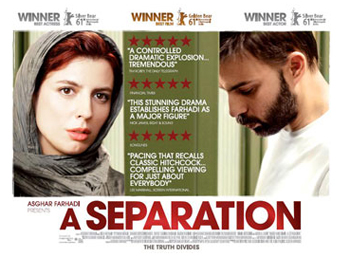A Separation ****
 Iranian writer-director Asghar Farhadi’s Nader and Simin, A Separation (Jodaeiye Nader az Simin), or A Separation for short, is an illuminating and moving drama from the heart of one of the Middle East’s most guarded nations, Iran. Farhadi gives a truly fascinating and contemporary picture of the tensions brewing at the heart of its society, through a seemingly average occurrence and a genuine mistake.
Iranian writer-director Asghar Farhadi’s Nader and Simin, A Separation (Jodaeiye Nader az Simin), or A Separation for short, is an illuminating and moving drama from the heart of one of the Middle East’s most guarded nations, Iran. Farhadi gives a truly fascinating and contemporary picture of the tensions brewing at the heart of its society, through a seemingly average occurrence and a genuine mistake.
Winner of the 2011 Sydney Film Prize and the Golden Bear at the 2011 Berlin Film Festival, including Silver Bears for both Best Actor and Best Actress, A Separation tells the story of a couple, Nader (Peyman Moaadi) and Simin (Leila Hatami), who still love each other but want a divorce, as she wants to live abroad and take their teenage daughter, Termeh (Sarina Farhadi), with her and he doesn’t because of his ailing father’s health. After unsuccessfully going before the courts, they decide on a separation, and Simin moves out. Nader hires Razieh (Sareh Bayat), a young woman to look after this father (Ali-Asghar Shahbazi) who is suffering from Alzheimer’s. But he doesn’t know his new help is not only pregnant, but also working without her unstable husband Hodjat’s (Shahab Hosseini) permission. Nader soon finds himself entangled in a web of lies, manipulation and public confrontations.
There is a raw but controlled emotional power to Farhadi’s pseudo-documentary film that has a surprising and profoundly deep-set compassion to it, as it deals with the questions of law, relationships and female independence in an intrepid and innovative manner.
From a female perspective, the opening scene is an empowering one, as Nader (Moadi) and Simin (Hatami) appeal to you – the camera/judge – for a divorce on shaky grounds, throwing all Western preconceptions to the wind about this often-portrayed ‘oppressive’ religious state. Simin represents the modern, independent route, whilst Razieh is the more obedient, traditional way. However, Farhadi expertly blurs the lines between both, giving his women a range of subtle nuances as they try to find solace and justice in their personal lives. Hatami and Bayat’s stellar performances bring an incredible feminine warmth, strength and intuition to their characters, allowing us to connect with these two women immediately, regardless of lifestyle, as they seek to find their voice in the escalating situation. Farhadi’s admiration for women is fully felt, especially education for females – as emphasised by scholarly Termeh, as well as the love for his country.
Even Farhadi’s male leads Nader (Moadi) and Hodjat (Hosseini) largely avoid the Iranian masculine stereotype. Both bristle with a misplaced pride and simmering resentment of the ever-present (and farcical) State intrusion on all matters, and though flawed, each shows a sensitive, caring side and a high regard for their women in their own unique way – a compelling contradiction, considering their initial treatment of each. These characters, masterfully brought to life by Moadi and Hosseini, address the tale’s issues of morality and deceit, and are as much victims as they are perpetrators, with Farhadi muddying the waters between good and bad personalities.
Farhadi’s style is courageous and hugely refreshing, almost Cinéma vérité of a secluded state, placing his film on a level footing with other such international relationship dramas – and dissolving religious boundaries in the process as it reaches out for that common thread: humanity. As the first Iranian film to win at Berlin, A Separation is quietly revolutionary film-making, executed in a thought-provoking fashion while triggering an exciting new Iranian voice of its own in this genre.
4/5 stars
By @FilmGazer
WATCH THE TRAILER